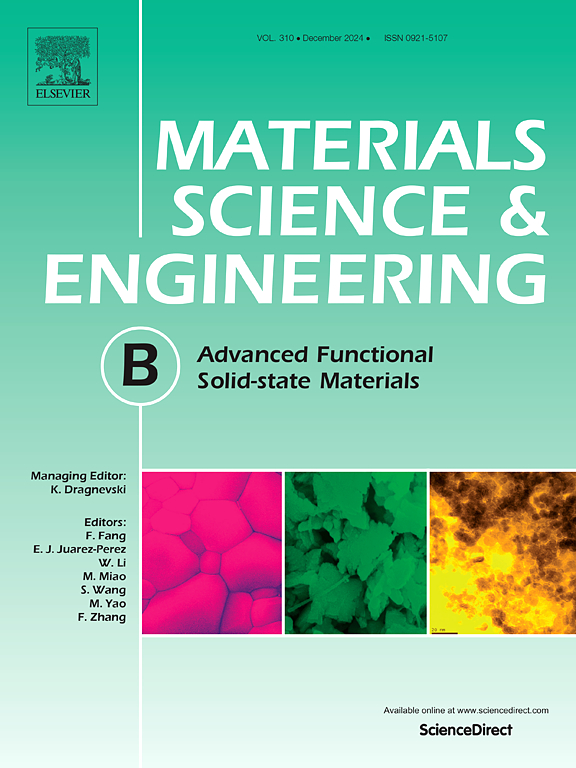通过 Sm 和 Sm@Ag 沉积提高 BaTiO3 珍珠岩纳米粒子的催化性能,实现环境可持续性
IF 3.9
3区 材料科学
Q2 MATERIALS SCIENCE, MULTIDISCIPLINARY
Materials Science and Engineering B-advanced Functional Solid-state Materials
Pub Date : 2024-11-06
DOI:10.1016/j.mseb.2024.117790
引用次数: 0
摘要
本文研究了使用 BaTiO3、Sm@BaTiO3 和 Sm@Ag@BaTiO3 纳米粒子(NPs)光催化降解亚甲基蓝(MB)的效率和过程。PXRD 分析表明,立方相 BaTiO3 NPs 的平均结晶尺寸分别为 36、48 和 57 nm。根据紫外可见光谱计算出的 BaTiO3、Sm@BaTiO3 和 Sm@Ag@BaTiO3 NPs 的带隙能分别为 3.73 eV、3.69 eV 和 3.65 eV。FESEM 分析确定了所制备的 NPs 的球形形态。在这些样品中,Sm@Ag@BaTiO3 NPs 在紫外光照射下降解 MB 染料的光催化活性优异,染料降解效率约为 83.20%。所制备的纳米粒子在连续四个周期后在还原 MB 染料方面表现出了显著的一致性,这表明它们具有重复使用的潜力。我们的研究表明,绿色合成的 BaTiO3、Sm@BaTiO3 和 Sm@Ag@BaTiO3 NPs 在可见光照射下具有优异的光催化活性,能有效降解 MB 染料。反酯化过程受多个反应参数的影响,包括醇油摩尔比(4:1)、催化剂用量(100 毫克)、反应时间(60 分钟)和温度(80 °C)。在这些优化条件下,当 0.5 M Sm@Ag@BaTiO3 NPs 存在时,在 80 °C 条件下反应 60 分钟,生物柴油产量最高可达 91%。此外,催化剂在至少五次运行中表现出稳定的性能,甚至在八次运行后仍能保持有效性。这些研究结果表明,在合适的反应条件下,该催化剂具有高效、低成本生产生物柴油的巨大潜力。本文章由计算机程序翻译,如有差异,请以英文原文为准。
Improving catalytic performance of BaTiO3 perovskite nanoparticles through Sm and Sm@Ag deposition for environmental sustainability
This paper investigates the efficiency and processes behind the photocatalytic degradation of Methylene Blue (MB) using BaTiO3, Sm@BaTiO3, and Sm@Ag@BaTiO3 nanoparticles (NPs). PXRD analysis revealed that cubic phase BaTiO3 NPs have mean crystallite sizes of 36, 48, and 57 nm, respectively. The band gap energies of BaTiO3, Sm@BaTiO3, and Sm@Ag@BaTiO3 NPs, computed from UV–Vis spectra, are 3.73 eV, 3.69 eV, and 3.65 eV. FESEM analysis determined the spherical shape morphology of the produced NPs. Among the samples Sm@Ag@BaTiO3 NPs demonstrated superior photocatalytic activity in degrading MB dye under UV light irradiation, achieving a dye degradation efficiency of approximately 83.20 %. The prepared nanoparticles showed significant consistency in reducing MB dye after four consecutive cycles, indicating their potential for repeated use. Our study demonstrates that green-synthesized BaTiO3, Sm@BaTiO3, and Sm@Ag@BaTiO3 NPs exhibit superior photocatalytic activity under visible light irradiation, effectively degrading MB dye. The trans-esterification process was influenced by several reaction parameters, including the molar ratio of alcohol to oil (4:1), the catalyst quantity (100 mg), the reaction duration (60 min), and the temperature (80 °C). Under these optimized conditions, the biodiesel yield reached a maximum of 91 % at 80 °C for 60 min in the presence of 0.5 M Sm@Ag@BaTiO3 NPs. Moreover, the catalyst demonstrated consistent performance across at least five runs and maintained effectiveness even after eight runs. These findings suggest that the catalyst has significant potential for producing biodiesel efficiently and cost-effectively under suitable reaction conditions.
求助全文
通过发布文献求助,成功后即可免费获取论文全文。
去求助
来源期刊
CiteScore
5.60
自引率
2.80%
发文量
481
审稿时长
3.5 months
期刊介绍:
The journal provides an international medium for the publication of theoretical and experimental studies and reviews related to the electronic, electrochemical, ionic, magnetic, optical, and biosensing properties of solid state materials in bulk, thin film and particulate forms. Papers dealing with synthesis, processing, characterization, structure, physical properties and computational aspects of nano-crystalline, crystalline, amorphous and glassy forms of ceramics, semiconductors, layered insertion compounds, low-dimensional compounds and systems, fast-ion conductors, polymers and dielectrics are viewed as suitable for publication. Articles focused on nano-structured aspects of these advanced solid-state materials will also be considered suitable.

 求助内容:
求助内容: 应助结果提醒方式:
应助结果提醒方式:


